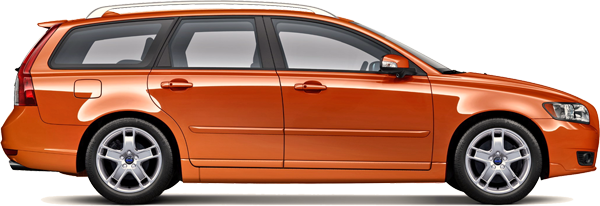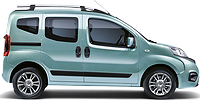The Comparative Analysis :
Volvo V50 2.0D Powershift Geartronic (08 - 10) vs. Hyundai i30 Station Wagon 1.4 T-GDI DCT (17 - 18)
€ 30,000

€ 25,400

€ 30,000
Base Price ⓘBase price of a new vehicle with standard equipment in Germany at market launch.
€ 25,400
ⓘBase price of a new vehicle with standard equipment in Germany at market launch. Price Info
Vehicle Dimensions
The Volvo V50 2.0D is a little smaller in every dimension. It's 2.5 inches shorter, an inch narrower and 0.3 inches lower than the Hyundai i30 Station Wagon 1.4 T-GDI.
Volvo V50 2.0D
Hyundai i30 Station Wagon 1.4 T-GDI
57.4
69.7
79.6
57.7
70.7
80.7
69.7 in
Width
70.7 in
79.6 in
Width Incl. Mirrors
80.7 in
57.4 in
Height
57.7 in
103.9
178
104.3
180.5
178 in
Length
180.5 in
103.9 in
Wheelbase
104.3 in
Vehicle Weight
Volvo V50 2.0D
Hyundai i30 Station Wagon 1.4 T-GDI
3296 lb
Curb Weight
3018 lb
4409 lb
Gross Vehicle
Weight
Weight
4145 lb

Weight Difference:
278 lb
8.43 %

General
Volvo V50 2.0D
Hyundai i30 Station Wagon 1.4 T-GDI
M
Generation
PDE
Station Wagon
Car Body Style
Station Wagon
Diesel
Fuel Type
Mid-Grade Unleaded

Front-wheel drive
Drivetrain
Front-wheel drive

6-speed dual clutch transmission
Transmission
7-speed dual clutch transmission
Engine
Volvo V50 2.0D
Hyundai i30 Station Wagon 1.4 T-GDI
Straight-four diesel engine with turbocharger
Engine Type
Straight-four gasoline engine with turbocharger
D4204T
Engine Code
4
Valves
4
4
Cylinders
4
2 L / 98 cu in
Displacement
1.4 L / 69 cu in
134 hp
at 4000 rpm
Power
138 hp
at 6000 rpm
Volvo V50 2.0D
134 hp
138 hp
Hyundai i30 Station Wagon 1.4 T-GDI
236 lb‑ft
at 2000 rpm
Max. Torque
178 lb‑ft
at 1500 rpm
Volvo V50 2.0D
236 lb‑ft
178 lb‑ft
Hyundai i30 Station Wagon 1.4 T-GDI
Performance
Volvo V50 2.0D
Hyundai i30 Station Wagon 1.4 T-GDI
127 mph
Maximum Speed
126 mph
9.7 sec
Acceleration 0 to 62 mph
9.5 sec
62 mph
62
mph
mph
443 ft
0.000 sec

Volvo V50 2.0D
62 mph
62
mph
mph
433 ft
0.000 sec

Hyundai i30 Station Wagon 1.4 T-GDI
▶ REPLAY
24.6 lb/hp
Weight-to-Power Ratio
21.87 lb/hp
Volvo V50 2.0D
24.6 lb/hp
21.87 lb/hp
Hyundai i30 Station Wagon 1.4 T-GDI
Fuel Economy / Emissions
Volvo V50 2.0D
Hyundai i30 Station Wagon 1.4 T-GDI
Fuel Economy
39 mpg
combined
43 mpg
Volvo V50 2.0D
39 mpg
43 mpg
Hyundai i30 Station Wagon 1.4 T-GDI
30 mpg
city
37 mpg
47 mpg
highway
47 mpg
13.7 gal
Fuel Tank Capacity
13.2 gal
539 mi
Range
565 mi
Volvo V50 2.0D
539 mi
565 mi
Hyundai i30 Station Wagon 1.4 T-GDI
Environmental Impact
123.4 kWh
Total Energy Consumption
per 100 miles ⓘThe total energy consumption per 100 miles is the amount of energy consumed by a vehicle when burning fuel or using electricity per 100 miles (final energy), and the energy required to produce the appropriate amount of fuel or electricity (primary energy).
per 100 miles ⓘThe total energy consumption per 100 miles is the amount of energy consumed by a vehicle when burning fuel or using electricity per 100 miles (final energy), and the energy required to produce the appropriate amount of fuel or electricity (primary energy).
104.1 kWh
Volvo V50 2.0D
123.4 kWh
104.1 kWh
Hyundai i30 Station Wagon 1.4 T-GDI
Euro 4
Emission Standard
Euro 6b (NEFZ)
256 g/mi (NEFZ)
CO2 Emissions
201 g/mi (NEFZ)
Practical Convenience
Volvo V50 2.0D
Hyundai i30 Station Wagon 1.4 T-GDI
5
Doors
5
5
No. of Seats
5
1113 lb
Maximum Payload
1127 lb
11.8 cu ft
Trunk Volume
17 cu ft










37 cu ft
Cargo Volume (Seats Down)
46.7 cu ft














